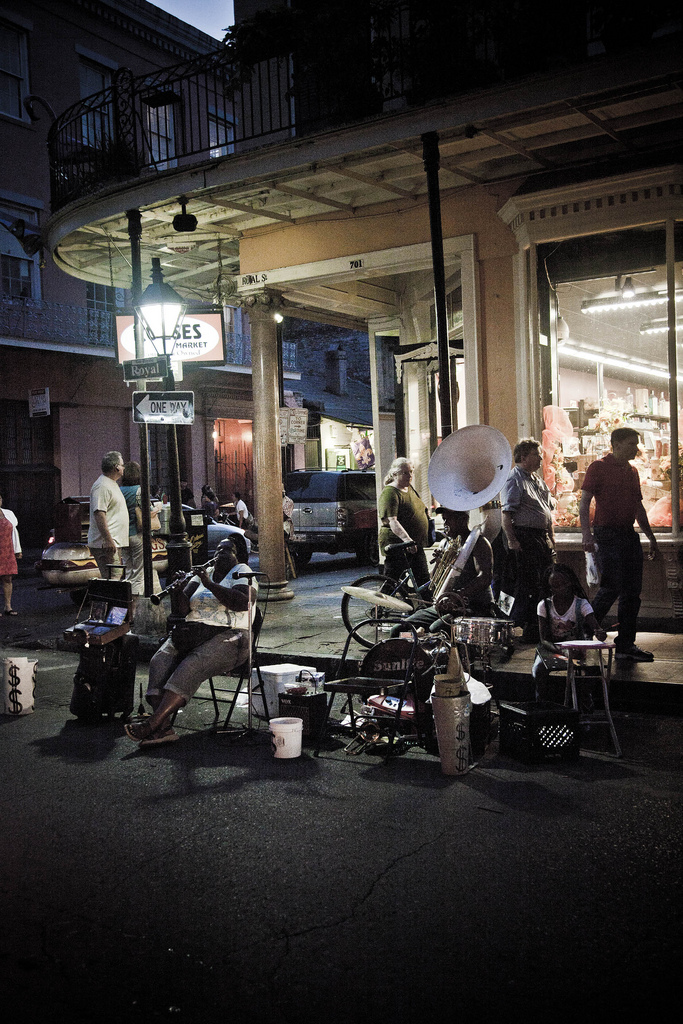
When I lived in Europe, I used to josh my British friends with a plan for Britain’s economic future (which looked dim at the time). I suggested that they tear down every structure built after the Seventeenth Century and restore the conditions—industrial, social, economic—of that earlier age, so that American tourists could be assured an authentic medieval experience. Something more realistic and edgier than Orlando’s Magic Kingdom. I assured them that, as a New Orleanian, I was an expert at roping in the tourists.
Being a native of an area loved by tourists has interesting effects on one’s own identity and worldview. Many contemporary scholars, including Tulane sociologist Kevin Fox Gotham, have contended that the spectacle created to lure tourists also impacts those natives involved in staging it. He looks closely at the recent history of the French Quarter in his 2007 study, Authentic New Orleans, and, in particular, at the struggle between residents and tourist industry interests. His most prescient insight is how local authenticity is at the same time a lure for tourists and an argument against further growth in the tourism sector. Since I was raised in the Quarter and Marigny, his thesis illumined for me many riddles of my own personal development, including the way I have staked my own New Orleanian “authenticity capital” in several different cities and countries, to great effect. I could list many other friends, especially musicians, who have benefited abroad in a similar way, by simply putting “New Orleanian” after their names.
Sadly, being a native of the Quarter and Marigny means a lot less in New Orleans itself than it does everywhere else. One of the great myths of New Orleans is its alleged insularity and nepotism. Such attitudes might have been true for the old downtown creoles (a hundred years ago), but the movers and shakers in our city today are far more interested in attracting people from elsewhere than in listening to the whining of the losers who were born here (Uptown perhaps excepted).
This is why, for me personally, the saddest datum in Gotham’s analysis is the precipitous decline of families with children residing in the Quarter over the past 50 years. The reasons are complex, including the huge spike in housing costs in the neighborhood as it attracts new residents—many of them part-time—from all over the world. The other notable decline (besides population density in general) is in the number of black residents. Indeed, as the city became blacker, the Quarter became whiter.
The City Council’s new curfew banning persons under 16 from the French Quarter and a big chunk of the Faubourg Marigny after 8 p.m. looks very much like an attempt to codify in law both of these unfortunate trends. It’s not the same thing as returning the old neighborhoods to some fabricated version of an authentic past; it’s far worse than that. District C Council Member Kristin Gisleson Palmer has said that she wishes to “protect” young people by keeping them out of an “adult-oriented section of the city” (“Council to weigh minors’ Quarter curfew,” Times-Picayune, 1/5). Jackson Square? Café du Monde? Do the tourists know they have to hide their kids in their hotel rooms even when, in the summer, it’s still light outside? Who designated this huge historic heart of the city “an adult-oriented section,” anyway?
Black critics claim that the law is intended to target black young people. They’re right, of course, but even if we pretended this were not the case, the idea stinks. I realize there’s a national trend to shield children from witnessing certain adult behaviors, e.g. drinking and smoking, but I fail to see what’s so dangerous about my kid hearing music through the doors of The Spotted Cat or d.b.a., just as, when I was a kid, we used to hang in front of the Faubourg or the Dream Palace. In fact, I WANT them to experience a radically integrated society, including different races, sexual orientations, and age groups. That’s precisely the reason I’m choosing to raise them in the old neighborhood. This law isn’t about protecting them, it’s about protecting tourists from seeing them. If the price for getting people to come to New Orleans is hiding my actual New Orleanian family (or moving to a family-approved residential zone), whatever is left of New Orleanian “authenticity” will finally be dead.
C.W.Cannon teaches in the English Department at Loyola University, and resides in the Faubourg Marigny with his wife and kids.
